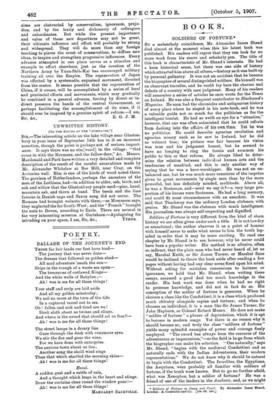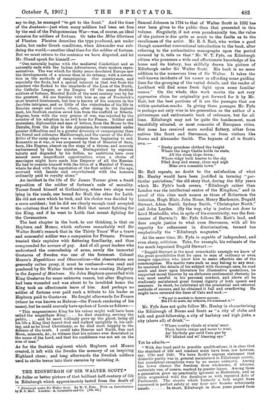BOOKS.
SOLDIERS OF FORTUNE.*
Bu a melancholy coincidence, Mr. Alexander Dines Shand died almost at the moment when this his latest book was published. His readers will regret that they can look for no more work from his suave and scholarly pen. The title of this book is characteristic of Mr. Shand's interests. He had a keen historical sense, but there was one side of history which attracted him above all others,—history as it was built up by personal gallantry. It was not an accident that he became the biographer of several distinguished soldiers. He himself was an observant traveller, and be could lay bare the charms and defects of a country with rare judgment. Many of his readers will remember a series of articles he once wrote for the Times on Ireland. He was also a frequent contributor to Blackwood's Magazine. He soon had the chronicles and antiquarian history of every place where he stayed in his note-book, and he was a valuable guide not so much for the politician as for the intelligent tourist. He had so swift an eye for a "situation," however, that one was often astonished that he could refrain from dashing into the affairs of his own time. Yet he was no politician. He could describe agrarian revolution and agrarian misery such as he saw in Ireland, but he did so without bias; his picture was fair because his vision was true and his judgment honest, but he seemed to have no longing to ring the tocsin and summon his public to this or that reform. He always liked to deter- mine the relation between individual human acts and the tendencies of mankind, and this is only another way of saying that he was a hero-worshipper. He was not an tin, balanced one, but he was much more conscious of the impetus given to great movements by single men than by the more powerful, but less definitely minded,, multitude. Above all, he was a. Scotsman, and—need we say it ?—a very large pro- portion of his heroes were Scotsmen. He had a long memory, and could fit most circumstances with an anecdote. It was said that Thackeray was the ordinary London clubman with genius. Mr. Shand was the clubman with much intelligence. His journalism was always self-respecting and dignified.
Soldiers of Fortune is very different from the kind of sham history we are often given under such a title. It is not tawdry or sensational; the author observes it as a point of honour with himself never to make what seems to him the truth lop- sided in order that it may be more exciting. To read one chapter by Mr. Shand is to see, however, why he never could have been a popular writer. His method is so allusive, often so indirect, that the plain man who had never heard of, let us say, Marshal Keith, or Sir James Turner, or Marshal Saxe would be inclined to throw the book aside after reading a few pages without having had any clear scene fixed upon his mind. Without asking for mistaken concessions to laziness or ignorance, we hold that Mr. Shand, when writing these essays, assumed a good deal too much knowledge in the reader. His best work was done when he had no sight to presume knowledge, and did not in fact do so. His conception of the soldier of fortune is generous. When he chooses a class like the Condottieri, it is a class which produced mach chivalry alongside rapine and torture; and when be chooses an individual, it is a man like Sir James Turner, Sir John Hepburn, or Colonel Robert Munro. He does not make " soldier of fortune " a phrase of depreciation, which it is apt to become in modern usage. Yet there is no reason why it should become so; and truly the class "soldiers of fortune" yields many splendid examples of power and courage finely employed. "The sword has always been the resource of the adventurous or impecunious,"—so the field is large from which the biographer can make his selection. " One naturally," says Mr. Shand, "begins with the mediaeval Condottieri and as naturally ends with the Indian Adventurers, their modern representatives." We do not know why it should be natural to begin with the Condottieri. The Israelites, the Egyptians, the Assyrians, were probably all familiar with soldiers of fortune, if the truth were known. But to go no further afield, what was Xenophon but a soldier of fortune? He was a friend of one of the leaders in the Anabasis, and, as we might * Soldiers of Fortune in Camp and Court. By Alexander Janes Shand. London: A. Constable and Co. [10e. 6d. net.] say to-day, be managed "to get to the front." And the time of the Anabasis—just when many soldiers had been set free by the end of the Peloponnesian War—was, of course, an ideal occasion for soldiers of fortune. Or take the Miles Oloriosus
of Plautus. Plautus describes the type produced, not under Latin, but under Greek conditions, when Alexander was sub- duing the world,—another ideal time for the soldier of fortune.
But we must return to the sentence we have disputed, and let Mr. Shand speak for himself :— "One naturally begins with the mediaeval Condottieri and as naturally ends with the Indian Adventurers, their modern repre- sentatives. The war which for thirty years desolated Europe saw the developments of a science then in its infancy, with a revolu- tion in the methods of campaigning. Our countrymen, and especially the Scots, had a special interest in that war from the numbers who flocked to the standards of the Lion of the North, the Catholio League, or the Empire. Of the many Scottish soldiers of fortune, Marshal Keith of the next century was by far the greatest. All are familiar with him as one of Frederick's most trusted lieutenants, but less is known of his concern in the Jacobite intrigues, and as little of the vicissitudes of his life in Russian camps and courts, where, after rising to the highest rank, his Scottish caution saved him from the scaffold or Siberia. Eugene, born with the very genius of war, was rejected by the country of his adoption in an evil hour for France. Soldier and statesman, diplomatist and man of letters, from the Meuse to the Danube, from the Alps to the Apennines, he commanded under greater difficulties and in a greater diversity of campaigning than his friend and colleague Marlborough, and the career of the Edler Ritter of the camp songs was a romance from beginning to end. Romantic as it was, it was surpassed by that of Maurice of Saxe, born, like Eugene, almost on the steps of s, throne, and scarcely embarrassed by the bar sinister. Distinguished by supreme talents and degraded by his follies, no ambitious hero ever missed more magnificent opportunities, when a choice of marriages might have made him Emperor of all the Russia,. Re had to console himself with the baton of a Marshal of France, where he died with the reputation of the first soldier of the age, crowned with laurels and overwhelmed with the honours ordinarily paid to royalty alone."
An incident in the life of Sir James Turner gives a frank exposition of the soldier of fortune's code of morality. Turner found himself at Gothenburg, where two ships were lying in the roads, one bound for Hull, the other for Leith. He did not care which he took, and his choice was decided by a mere accident; but he did see clearly enough (and accepted the solution) that if he went to Hull that meant fighting for the King, and if he went to Leith that meant fighting for the Covenanters.
The best chapter in the book, to our thinking, is that on Hepburn and Munro, which enforces remarkably well Sir Walter Scott's remark that in the Thirty Years' War a brave and successful soldier was a companion for Princes. Princes treated their captains with flattering familiarity, and thus compounded for arrears of pay. And of all great leaders who understood the comradeship of arms, surely the immortal Gustavus of Sweden was one of the foremost. Colonel Munro's Expeditions and Observations—the observations are generally rather prosy, it must be confessed—was read and pondered by Sir Walter Scott when he was creating Dalgetty in the Legend of Montrose. Sir John Hepburn quarrelled with King Gustavus for some unknown reason, but after Hepburn had been wounded and was about to be invalided home the King took an affectionate leave of him. And perhaps no soldier of fortune ever paid such a tribute to his leader as Hepburn paid to Gustavus. He fought afterwards for France (where he was known as Hebron—the French rendering of his name), but be could scarcely have spoken of Louis as follows :- "This magnanimous King for his valour might well have been called the magnifique King : . . . he died standing, serving the public, . . . and he most willingly gave up the ghost, being all his life a King that feared God and walked uprightly in his call- ing, and as he lived Christianly, so he died most happily in the defence of the truth. I could take Heaven and Earth. Sun and Moon, minerals, Fic., to witness that his oolours ever flourished in the name of the Lord, and that his confidence was not set on the arm of man."
.As for the Scottish regiment which Hepburn and Munro created, it left with the Swedes the memory of an inspiring Highland cheer; and long afterwards the Swedish soldiers used to strike terror into their enemies by imitating it.































































 Previous page
Previous page